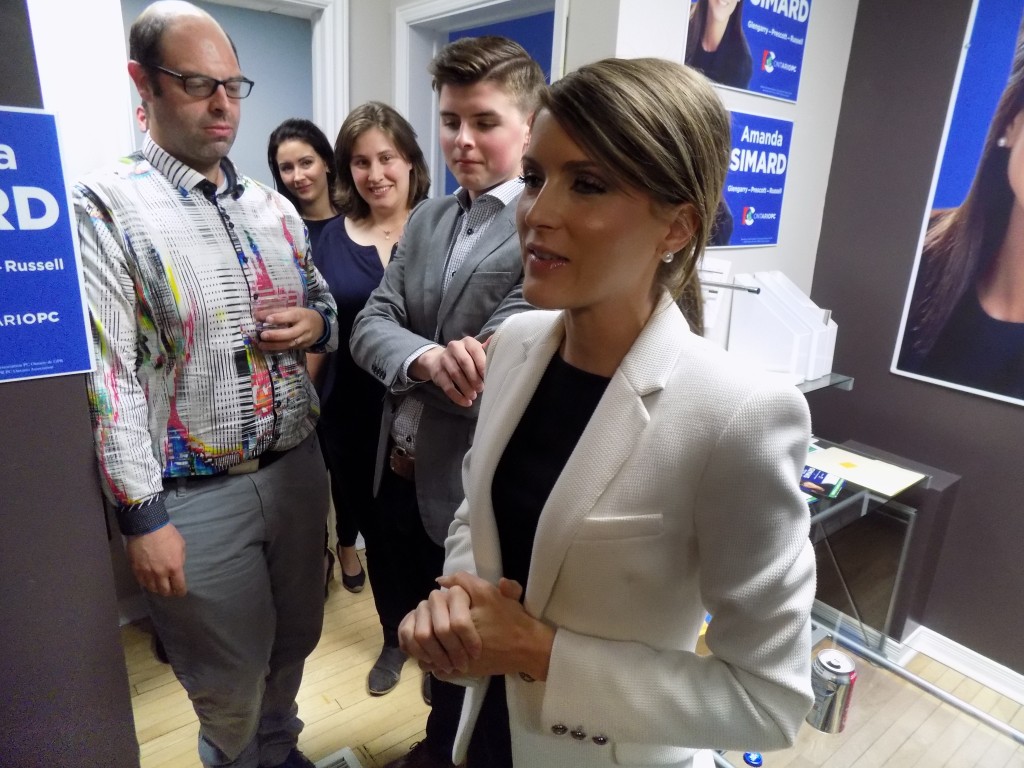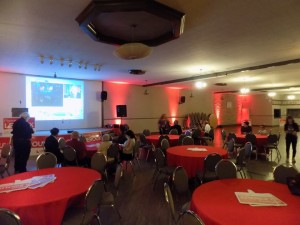Ontario takes a right turn with conservative election win

Progressive Conservative candidate Amanda Simard, who won in the Glengarry-Prescott-Russell-District, addressing her supporters at local campaign headquarters in Embrun. Photo: James Morgan
Provincial results
Ontario is in for big changes politically. The Progresssive Conservative (PC) Party, led by Doug Ford won the election on Thursday, defeating the Liberals led by Premier Kathleen Wynne. Ford will be the province’s next Premier.
The PC’s won the election with 40.5% of the popular vote and will have 76 of the 124 seats in the legislature in Toronto. The democratic socialist New Democratic Party (NDP) will form the Official Opposition.
The NDP received 40.6% of the vote and will have 40 seats in the legislature. Leader Andrea Horwath was hoping to lead the NDP to victory. The party had a tumultuous five years in government under former Premier Bob Rae from 1990 to 1995. The last time it was the Official Opposition was from 1975 to 1977 under Stephen Lewis, who later served as the United Nations Special Envoy for HIV/AIDS in Africa.
The Liberals, who had been in power since 2003, and were facing significant unpopularity, received just 19.6% of the vote and only seven seats. They fell just short of the eight seats required to be recognized as an official party in the legislature and it was the party’s worst electoral result in Ontario history. In a lengthy concession speech in Toronto, Premier Wynne resigned as Liberal leader. History was made for the Green Party whose leader Mike Schreiner was elected in Guelph, west of Toronto, giving the Greens their first seat in the Ontario Legislature.
Ford Nation
Premier-elect Doug Ford is the brother of late Toronto Mayor Rob Ford, who was known for his issues involving drug and alcohol use. The Ford’s have their own brand of conservative populism and their followers are known as “Ford Nation.” Ford never released a fully-costed election platform, and ran on promises of lower taxes, lower power rates, and things like low-cost “buck a beer” in private stores. The campaign slogan was “For the People,” and Doug Ford portrayed himself as the ordinary Toronto suburbanite who “was out for the little guy.”
In the final days of the campaign, Rob Ford’s widow Renata launched a lawsuit against Doug Ford, alleging that as a trustee of his late brother’s estate, he had not been making payments to her and her children, and that he had diminished the profitability of Deco Labels and Tags, the family business, which is best known for producing the stick-on labels supermarkets put on plastic-wrapped meat.
The Ford platform was a major contrast to the NDP, which promised higher taxes on the wealthy, significant investments and expansion of social programs, and to re-nationalize Hydro One, the province’s largest power transmission and distribution utility, which had been privatized by the Liberal government. The Liberals had promised similar expansions of social programs and infrastructure improvements.

The Ontario Liberal Party was defeated after 15 years in power. A small number of Liberal supporters gathered at Glengarry-Prescott-Russell candidate Pierre Leroux’s event in Embrun. Photo: James Morgan
Eastern Ontario and Ottawa results
All three major parties had victories throughout eastern Ontario. Kingston swung to the NDP with candidate Ian Arthur defeating Liberal incumbent Sophie Kiwala and former Kingston Mayor Gary Bennett, the PC candidate. In districts fronting the St. Lawrence River, PC legislator Steve Clark was re-elected in Leeds-Grenville-Thousand Islands and Rideau Lakes. In Stormont-Dundas-South Glengarry, which includes the city of Cornwall, PC incumbent Jim McDonnell was re-elected. Progressive Conservative candidate Amanda Simard won in Glengarry-Prescott-Russell, ending many years of Liberal representation there. Liberal legislator Grant Crack was not seeking re-election, leaving the district open for change. In the Carleton district surrounding Ottawa, Goldie Ghamari won for the PC’s.
In the urban Ottawa districts, the Liberals lost Ottawa Centre to the NDP. Liberal John Fraser kept his Ottawa South seat and Nathalie Des Rosiers retained the Liberal stronghold of Ottawa-Vanier. In Kanata-Carleton, PC Merilee Fullerton defeated Jack MacLaren, a former PC legislator who was removed from caucus two years ago amid accusations of sexual harassment. MacLaren had sat as a member of the small Trillium Party. Popular PC representative Lisa MacLeod was re-elected in Nepean and Jeremy Roberts won the Ottawa West-Nepean district. Liberal Marie-France Lalonde was re-elected in Orleans, a district in the eastern part of Ottawa. Lalonde and Des Rosiers had both been members of Kathleen Wynne’s cabinet. Lisa MacLeod is rumoured to be a prospective member of Doug Ford’s cabinet.
The Progressive Conservatives, under their various incarnations, have governed Ontario for most of its history. The “Tories’ as they’re also known, once governed the province from 1943 to 1985 under a series of moderate to even slightly left-leaning Premiers. Ontario politics have normally been rather sedate and whoever ran the most moderate campaign with the blandest promises won. The depth of Doug Ford’s populist rhetoric and the extent it will be put into action remains to be seen.







